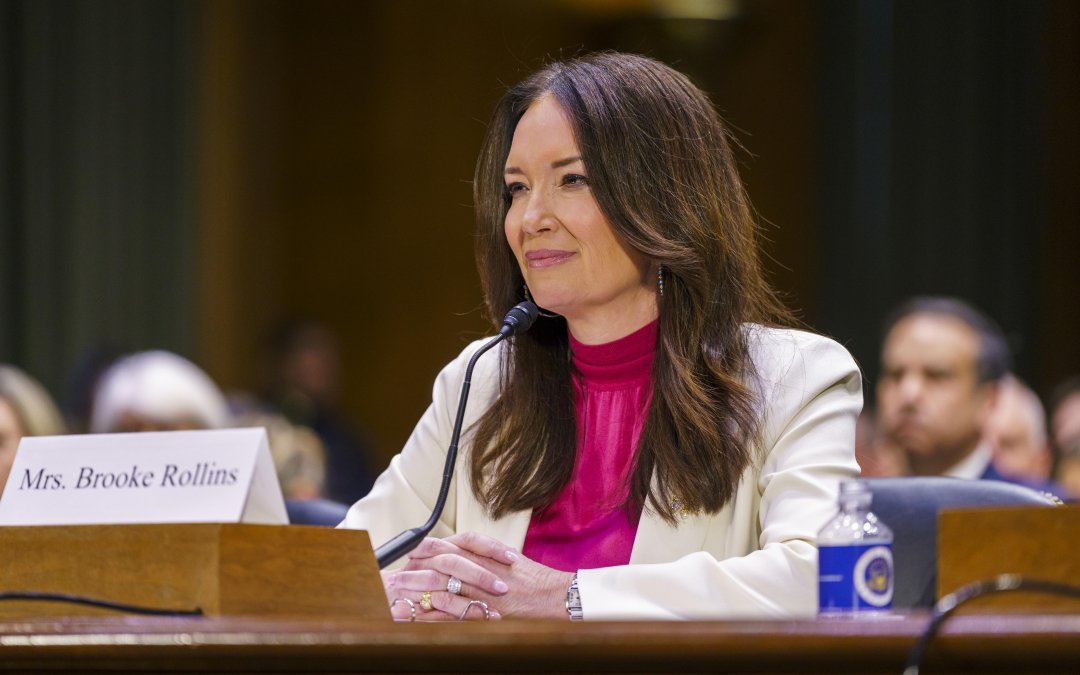WASHINGTON – Brooke Rollins, President Donald Trump’s nominee for Secretary of Agriculture, defended President Trump’s immigration, tariff and telework policies Thursday during her confirmation hearing before the United States Senate Committee on Agriculture, Nutrition, and Forestry.
Though the hearing was a significant contrast to the heated hearings from the previous week, including those of Attorney General nominee Pamela Bondi and Defense Secretary nominee Pete Hegseth, Democrats pressed her on the topics of nutrition programs, the USDA office logistics and immigration.
Sen. Dick Durbin (D-Ill.) told the story of a three-generation dairy farmer who spoke of going out of business due to a lack of immigrant workers.
“Dangerous people shouldn’t be here, and if they’re here they should be gone. Period. But when we’re talking massive deportation, we’re going beyond dangerous criminals. And I just wonder if we ought to give fair warning to farmers and ranchers across America that if you have immigrant labor, you can expect federal agents to come and search your property,” said Sen. Durbin.
To this, Rollins said she was not involved in Trump’s immigration efforts.
She was more pointed when asked about cuts to nutrition programs like SNAP.
“Will you commit to opposing any cuts to SNAP that would prevent Americans, including millions of children, from putting food on their table?” asked Sen. Ben Ray Luján (D-N.M.)
“Probably not surprising to you, I can’t commit to that,” said Rollins. “I also know that I have a duty to the taxpayer who is funding, in significant numbers, those programs.”
In the hearing, Rollins set a goal of 60% for in-person work for USDA office workers, citing Trump’s recent executive order compelling regarding work from home for federal workers back to the offices. Regarding DEI initiatives for the USDA, she said she would prioritize merit in hiring but hopes for diversity in backgrounds.
Sen. Elissa Slotkin (D-Mich.).Senators pressed her on Trump’s proposed tariffs and the potential for retaliatory measures impacting U.S. agriculture, citing the retaliatory tariffs China imposed on agriculture products against Trump’s tariffs during his first term in office.
“So you can imagine, as a Michigander, the throwing around of tariffs, particularly with Canada, Mexico, a bunch of other places, I’m trepidatious that this is going to come back to our farmers. And when you get confirmed, and it looks like you will, you will swear an oath to the Constitution of the United States, not to President Trump,” said Sen. Elissa Slotkin (D-Mich.).
Ranking Member Sen. Amy Klobuchar (D-Minn.) pointed out her leadership role at the Texas Public Policy Foundation, an organization critical of biofuels, including ethanol. Rollins said that the group publishes 900 to 1,000 pieces each year and that she did not author the piece in question.
“To be clear, there’s no doubt coming from Texas,” said Rollins, “I was a massive defender of fossil fuels and the importance of fossil fuels in the energy independence and energy dominance narrative.”
At the hearing, Rollins was joined by family members and her high school agriculture teacher. She brought her Texas roots center stage throughout the hearing, noting her time as an “Aggie” at Texas A&M University after a childhood on a farm with a single mother.
Rollins said she met with every senator on the committee before the hearing and gave them her cellphone number. When senators asked Rollins about their respective state issues, Rollins appeared very open to collaboration and bipartisan work, being invited to visit several states’ rural areas.
After the hearing, Rollins told reporters she felt confident about how it went.
“I am such a believer in federalism and the 10th Amendment, and you give the laboratories of democracy and the governors the power to innovate and to experiment. And if it works, then you follow that around the country.”

